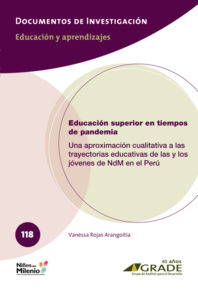Educación superior en tiempos de pandemia. Una aproximación cualitativa a las trayectorias educativas de las y los jóvenes de NdM en el Perú
| Year | : | 2021 |
|---|---|---|
| Author/s | : | Vanessa Rojas |
| Area/s | : | Education and learning |
Rojas, V. (2021). Educación superior en tiempos de pandemia. Una aproximación cualitativa a las trayectorias educativas de las y los jóvenes de NdM en el Perú. Lima: GRADE. Documentos de Investigación, 118.
In recent years, university education has experienced a significant increase in Peru. Sánchez, Favara and Porter (2021b) point out that, according to the Educational Quality Statistics Unit (Escale) of the Ministry of Education (Minedu), the gross attendance rate in higher education went from 38% to 77% among the years 2001 and 2019 (for young people from 17 to 21 years old). In this context of growth, the university reform (2014) and the creation of the National Superintendency of Higher Education (Sunedu) have been clear signs, from the State, of the will to regulate the increase but also the quality of this educational level. However, in 2020, and as a consequence of the health emergency caused by COVID-19, higher education suffered several impacts related to the provision of the service, as well as the dropout and enrollment of students (Benites, 2021). And, although there is still little evidence regarding the experiences of students in this atypical situation, it is known, for example, that families and students presented complaints related to the clarity of the education received in virtual or non-face-to-face mode during the year 2020, a situation that led Minedu to announce greater vigilance on the education provided (Figallo, González and Diestra, 2020). This study seeks to approach – from the same voices of young people – to an understanding of the main barriers that they had to face in relation to access and continuity of their studies as a result of the pandemic. It is also intended to show how the crisis unleashed by COVID-19 put educational opportunities at risk and postponed the future educational plans of the young people who were part of this research.







